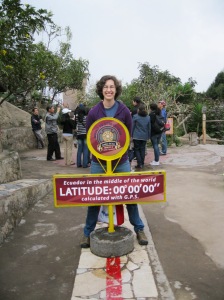The Incas
July 30, 2013 Leave a comment
I am still a little sad that I missed out on my work’s study abroad trip to Peru last summer. They went to Macchu Pichu and saw the Nazca lines and all I did was try to get a job. Going to Ecuador this past summer was a bit of a consolation, but I really feel that I missed out on the true “Inca Experience”.
I mention this because I am currently reading a book called The Incas, which is a work of historical fiction by Daniel Peters. I picked it up last February at my local Friends of the Library book sale. It is enormous and I had never heard of it or the author before, but it was only 1 dollar, so I took it home with me and have been slowly plowing through it. I’m currently on page 610 with about a third of the book to go, so this clearly isn’t for the faint of heart. However, it isn’t exactly an anthropological treatise either – it is as much fiction as historical. I would say that this book is really about the characters and their experiences, with the historical Inca empire as the backdrop, permeating the entire story with its ambiance.
By ambiance, I mean all that stuff I missed out on when my colleagues went to Peru last summer. Most of the action so far in the book has taken place in what is now Peru, which is logical, since the capital of the Inca empire was Cuzco. I felt a little soothed out of my sadness, reading this book, because the author really imbues the story with details about ancient Peru. Not the same as being there, but still pretty awesome.
The book starts off very personal, focusing on a few families and their everyday lives in the Inca empire. But the first major historical event in the book is the Inca war/conquest of the Quitus, which happened around 1512 AD. If the tribe name sounds familiar, it’s because this is the group that was living around present-day Quito Ecuador – so they got around to a place I had visited after all! The Inca empire actually stretched into parts of modern Colombia and Chile, but the conquest of the Quitus was especially important because of their location.
The Inca civilization held Lake Titicaca (in the south of Peru) to be holy, as it was thought to be where the first Incas came from. Cuzco of course was very important as the empire’s capital. But Quito was also an important site – so important that it was considered a second capital of the empire. At first I thought this might have been so that the Inca ruling class could have a base from which to control the northern parts of the empire. This might have been the result, but the Incas had a sacred reason for conquering Quito.
Yep, the Equator! The Incas (and the Quitus, for that matter) were advanced scientists and astronomers, and they knew that there was something geographically special about the Equator – the place where the sun rose and set at exactly 6 every day. It was important for the Incas to hold this spot, so a-conquering they went. The Quitus didn’t put up a lot of resistance, so the city was taken mostly unscathed, but the Incas didn’t hold it for long. This wasn’t due to a rebellion, but rather the arrival of the Spanish. So when you go to Quito, you don’t see a lot of Inca influence. But if you’d like to get a feel for this ancient civilization, I would recommend this book. I haven’t finished it yet (although I know how it ends), but it’s an interesting and engaging read.

